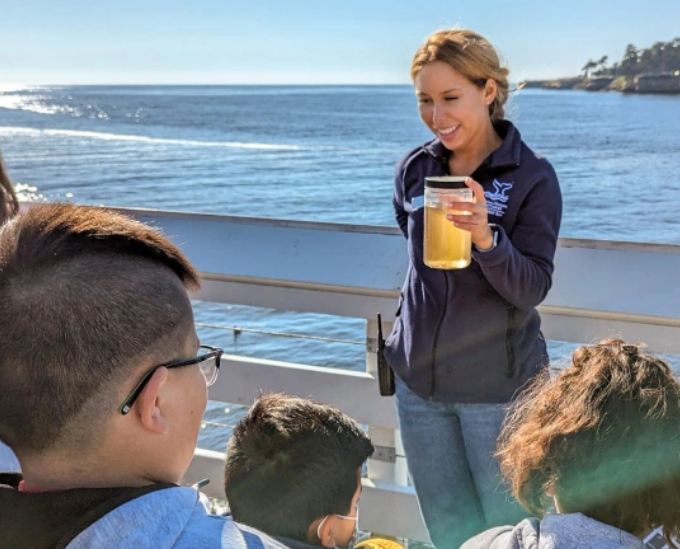
Blog: Finding Sanctuary – Education program fosters next generation of environmental stewards By: Lisa Wooninck

Ariana Acosta educates students about plankton. (Contributed)
By: Lisa Wooninck
Published: Santa Cruz Sentinel, April 15, 2023
As we experience more extreme weather patterns, many are recognizing that we are in a climate emergency and advocating for immediate action.
Further, the most severe impacts of climate change fall disproportionately on low-income populations, who are most exposed and least able to recover from environmental disasters. Educators at Monterey Bay National Marine Sanctuary and partners are addressing this disparity in climate preparedness by promoting environmental literacy, including climate literacy, in local schools to create more informed community members able to advocate for sustainability and environmental equity.
Some of the largest barriers to providing environmental education within low-income school districts include program and bus transportation costs. A four-year grant from the California State Outdoor Equity Program supports Monterey Bay Sanctuary to conduct education programs for fourth and fifth grade classes from Watsonville.
Classes participate in environmental education at their schools and during outdoor field trips to the Sanctuary Exploration Center at no cost to the teachers. “Overcoming these barriers allows students from diverse socioeconomic backgrounds to experience the sanctuary and build their own personal connection to the ocean”, says Ariana Acosta, school programs specialist.
“For some, this might be their first time experiencing the ocean,” says Acosta. “School groups come to our visitor center to take part in hands-on and interactive programs that get the students out into nature exploring and conducting science. They learn about the sanctuary’s incredible biodiversity and some of its resource protection threats. Through these field trips, students get to view wildlife, collect scientific data, and create connections between their daily actions and the natural world around them.”
In one field trip activity, students collect seawater samples containing tiny plankton. They learn how phytoplankton are the basis of the food chain and absorb carbon dioxide to produce oxygen, much of which we rely upon to breathe. In addition to reducing CO2, the ocean mitigates climate change by acting as the largest heat sink on the planet.
Bilingual educators, such as Acosta, are essential for promoting equity and represent underserved communities culturally and linguistically. With educational content provided in English and Spanish, English language learners are able to engage with the program’s messages rather than focusing on translating and understanding each word.
The Outdoor Equity Program is more than a school program and importantly aims to engage with multi-generational community members of Watsonville. For example, college students are able to intern with the sanctuary as field trip mentors. In doing so, the young mentors are exposed to various marine-related careers.
By facilitating pathways from student to young leader, and eventually to marine professional, the sanctuary is reinforcing avenues for the next generation of environmental leaders. Acosta is a role model of this pathway as she once was a UC Santa Cruz student interning with the sanctuary. That internship ultimately led to her current position as sanctuary educator.
The Sanctuary Exploration Center will be hosting Día de la Comunidad, or Community Day, on May 27. This day celebrates the fourth and fifth grade students of the Outdoor Equity Program field trips and all of the teachers and college mentors involved in promoting the sanctuary’s health in Watsonville classrooms.
Students are invited to bring their family and friends to share their new knowledge and ocean connections. Our visitor center will be showcasing unique pop-up exhibits as well as offering special beach activities and wharf kayaking for Día de la Comunidad event attendees. Free shuttle transportation will be provided for Watsonville residents. For information about Dia de la Comunidad or the Outdoor Equity Program, email Ariana.acosta@noaa.gov.
Lisa Wooninck became the superintendent of NOAA’s Monterey Bay National Marine Sanctuary in 2021. She has a doctorate in ecology and evolutionary biology, and marine biology from UC Santa Barbara. She can be reached at lisa.wooninck@noaa.gov. To learn more about the sanctuary, visit https://montereybay.noaa.gov/.
